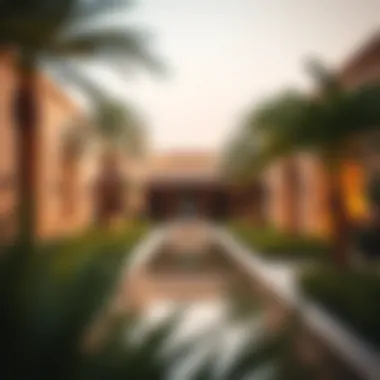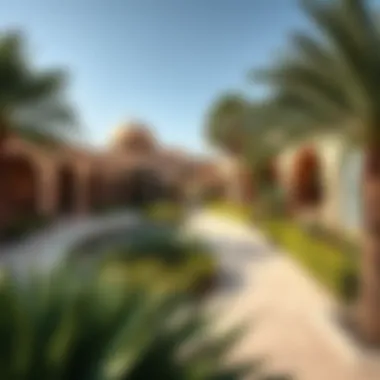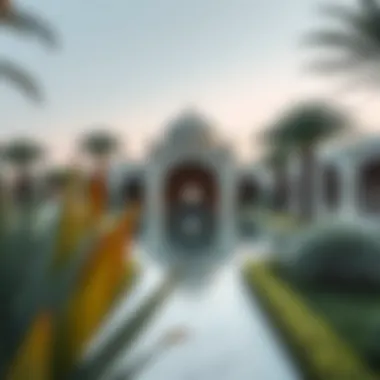Discover Rufi Gardens: A Unique Oasis in Dubai


Intro
In the heart of Dubai, Rufi Gardens emerges as a green oasis, a sanctuary amid the urban sprawl. With the city’s fast-paced lifestyle, the find of a peaceful retreat is invaluable. Rufi Gardens offers a blend of history, ecological importance, and artistic design, serving as more than just a park—it’s a vital piece of the urban puzzle.
This section sets the stage for a deeper exploration of what makes Rufi Gardens special. As we delve into its historical roots, design features, and the myriad opportunities tucked within its borders, we’ll also highlight how such spaces contribute significantly to enhancing the quality of urban life. In an environment where real estate market and sustainability coalesce, understanding Rufi Gardens becomes necessary for investors, agents, and homebuyers alike.
Preparing yourself for the journey ahead means grasping the multi-dimensional appeal of Rufi Gardens—its blend of recreation, biodiversity, and function is indeed a marvel amidst the bustling cityscape.
Foreword to Rufi Gardens
Rufi Gardens is not just a parcel of greenery tucked away in Dubai; it embodies an intricate blend of history, culture, and ecological significance that elevates urban living. This unique oasis has carved out its importance in the bustling city, transforming the landscape while providing a sanctuary for flora and fauna, as well as the community. In a world increasingly dominated by steel and concrete, Rufi Gardens stands as a refreshing reminder of nature’s role in urban spaces.
Historical Background
The history of Rufi Gardens runs deeper than its vibrant flora. This space was initially conceived during a period when Dubai was beginning to undergo rapid transformation. Originally a desert landscape, the establishment of this garden marked an important shift in Dubai's urban planning. Designed with both aesthetic and functional elements in mind, Rufi Gardens reflects the city’s ambitions to meld green spaces into its modern narrative. With every tree planted and path paved, it represents a commitment to eco-friendliness amidst the urban sprawl.
The garden's historical layers tell tales of agricultural practices and local flora that preceded its landscaping. It took years of thoughtful design and community input to realize a space that both respects its roots and embraces modernity. This combination of historic appreciation and future-focused aspirations makes Rufi Gardens a reflection of Dubai’s development path.
Cultural Significance
Culturally, Rufi Gardens serves as a microcosm of Dubai's diverse community. It is a space where people from various backgrounds come together, making it a melting pot of traditions and social interactions. The garden’s design incorporates elements that reflect the rich cultural tapestry of the region, enhancing its relevance to those living in and around Dubai.
Moreover, events held in Rufi Gardens often showcase local arts, crafts, and culinary traditions, allowing visitors to immerse themselves in the local ethos. Such activities strengthen community bonds and foster a sense of belonging. For investors and homebuyers, this cultural vibrancy is a significant draw, as it augments the lifestyle quality and attractiveness of neighborhoods adjacent to the garden.
In summary, Rufi Gardens is not merely a green space—it is a vital part of Dubai's social and cultural fabric. History flows through its soil, while contemporary cultural practices breathe life into its paths. This oasis is a key factor for those interested in real estate, sustainability, and urban living.
Ecological Importance of Rufi Gardens
Rufi Gardens stands out as a sanctuary amidst the bustling urban sprawl of Dubai. Beyond its visual allure, the ecological importance of this green space cannot be overstated. It represents a critical asset in promoting biodiversity, enhancing local ecosystems, and fostering sustainable practices within the cityscape.
Biodiversity in Urban Settings
In cities, where concrete often reigns, green spaces like Rufi Gardens become vital for maintaining biodiversity. These gardens serve as critical habitats for various species, including birds, insects, and small mammals. For instance, one might spot a vibrant flash of red from a local parakeet nestled among the greenery.
The diversity of flora planted here acts like a buffet for pollinators such as bees and butterflies, which are crucial for our food production. Unlike traditional parks that often feature homogeneous plantings, Rufi Gardens embraces a plethora of native species. These plants are adapted to the local climate, requiring less water and maintenance, thus supporting a more resilient ecosystem.
"Biodiversity is not just about species; it's about the relationships amongst them. Rufi Gardens exemplifies this interconnectedness within an urban setting." - Environmentalist Comment
Maintaining biodiversity in urban settings benefits not just wildlife, but also enhances human experiences. Nature has a soothing effect on our mental well-being; walking through lush, green paths can uplift spirits more than any concrete structure can.
Sustainability Practices
Rufi Gardens doesn't just boast an impressive array of plants and animals; it's a hotspot for sustainable practices as well. The garden employs multiple strategies to reduce its carbon footprint and enhance environmental health.
Some noteworthy practices include:
- Rainwater Harvesting: Rufi Gardens utilizes rainwater collection systems to irrigate plants. This method conserves valuable resources and reduces the reliance on city water supply.
- Composting: Organic waste generated within the garden is turned into compost, enriching the soil naturally and reducing landfill waste.
- Native Plantings: By selecting plants that are indigenous to the region, Rufi Gardens minimizes the need for fertilizers and pesticides, as these plants thrive naturally in their environment.
One of the striking features of this garden is its community involvement in sustainability efforts. Local residents often engage in workshops, learning about permaculture and ecological gardening techniques that they can implement in their own homes. This collective knowledge fosters a sustainable community spirit, allowing everyone to contribute to local ecology while enjoying the fruits of a greener environment.
In summary, Rufi Gardens serves as a model of ecological importance through its focus on biodiversity and sustainability. The interplay of these elements creates not only a thriving ecosystem but also encourages community involvement and environmental awareness, vital in today's urban environments.
Key Features of Rufi Gardens
Rufi Gardens presents a captivating blend of nature and urban living. This unique oasis not only serves as a recreational retreat but also plays a pivotal role in enhancing the quality of life for residents and visitors alike. The features of Rufi Gardens highlight how thoughtful design and planning can harmonize with the environment, promoting an ecosystem that benefits both flora and fauna, while providing a sanctuary for people within the bustling city of Dubai.
Landscape Design


Plant Selection
Plant selection is a crucial aspect of landscape design in Rufi Gardens. The diversity of plants incorporated in this green oasis not only adds aesthetic value but also supports local wildlife. Native species such as Ghaf trees and Date Palms flourish in the garden, providing shade and creating habitats for various birds and insects.
These selections prove to be beneficial choices for sustainability efforts due to their adaptability to local climate conditions, ensuring lower maintenance costs. Additionally, the use of indigenous plants fosters a connection to the region’s natural heritage, celebrating the local ecology. However, careful consideration must be given to the balance between native and non-native species to avoid disrupting the local ecosystem.
Layout and Accessibility
The layout and accessibility of Rufi Gardens have been designed with community engagement in mind. Wide pathways and clear signage guide visitors through the verdant landscape, making it easy for everyone to navigate, including families with strollers or individuals with mobility challenges.
By emphasizing a layout that encourages exploration, this garden becomes more than just a walking space; it becomes a vibrant meeting point for the community. Having easy access to various areas encourages a sense of connection among visitors. However, there might be concerns regarding the management of foot traffic in peak hours, which could lead to congestion in popular areas.
Water Management
Water management systems within Rufi Gardens are innovative and imperative for maintaining its lush environment, especially in an arid climate like Dubai's. The garden features a modern irrigation system designed to conserve resources while ensuring that plants receive adequate hydration.
This responsible approach not only conserves water but also models sustainable practices that can be replicated in other urban developments. The presence of rain gardens and permeable pathways further enhance the garden’s ability to manage stormwater effectively. One downside could be the initial investment in such systems, but the long-term benefits far outweigh the costs.
Recreational Areas
Walking Paths
The walking paths in Rufi Gardens are not just routes to traverse but integral components of the whole experience. These paths weave through beautiful landscapes, encouraging visits at all times of the day. High-quality materials and thoughtful constructions make them accessible and safe for all.
The main characteristic of these paths is their interconnectedness; visitors can explore diverse garden aspects without feeling lost. This design promotes not just relaxation but also physical activity, providing an excellent venue for residents to exercise amidst nature. A potential challenge is ensuring that the paths remain well-maintained, as wear and tear can detract from the overall experience.
Children's Play Areas
Children’s play areas in Rufi Gardens are carefully designed to foster creativity and activity among younger visitors. These spaces include natural features like logs and boulders, mimicking nature while providing safe play environments. As children engage with their surroundings, they develop important motor skills and an appreciation for nature’s textures and forms.
The uniqueness of these areas also lies in the cultural and educational elements integrated into the play structures. By including local themes and educational signage, children learn about their environment while having fun. Safety is naturally a top priority, but ongoing assessment of play equipment is necessary to ensure continued safety as usage increases.
Community Spaces
Rufi Gardens features community spaces that encourage social interaction and collaboration. These areas are designed to host events, picnics, or simply be gathering spots for informal meetings. By providing such spaces, the gardens significantly contribute to strengthening community bonds.
Events held in these spaces foster a sense of belonging and togetherness among residents. They can range from seasonal festivals to weekly farmers' markets, summarising the rich cultural tapestry. The potential hindrance, of course, could arise from the need for management and scheduling of these events to ensure everyone's interests are considered, but the long-term community engagement outweighs these concerns.
Flora and Fauna
The role of flora and fauna in Rufi Gardens not only enhances its aesthetic appeal but also contributes significantly to the ecological balance in an urban environment like Dubai. This garden serves as a remarkable refuge for numerous plant species and wildlife, which might otherwise struggle to survive in the concrete jungle. A closer look at the native plants and wildlife found in Rufi Gardens provides valuable insights into its ecological importance.
Native Plants
Rufi Gardens is home to a variety of native plant species well-adapted to the local climate. These plants have evolved to thrive in Dubai's arid conditions, making them more resilient to heat and drought. One of the standouts is the Ghaf tree, which is known for its deep roots and ability to survive on limited water. These trees provide not just shade but also habitat for some wildlife. Additionally, the flowering plants like Desert lily and Ziziphus spina-christi showcase vibrant blooms that attract pollinators, enhancing biodiversity in the area.
The significance of these native plants extends beyond beautification. They play a critical role in conserving soil health, preventing erosion, and supporting local ecosystems. By planting species that are indigenous, Rufi Gardens is not only fostering sustainability but also ensuring that the garden's ecosystem remains resilient against environmental stresses. The integration of these plants into the landscape design also allows visitors to appreciate the natural heritage of the region.
Wildlife Observations
The fauna in Rufi Gardens offers a fascinating glimpse into the biodiversity that urban spaces can accommodate. While one might not expect to encounter much wildlife amidst the bustling city, Rufi Gardens is home to numerous bird species, small mammals, and insects that contribute to its vibrant ecosystem.
Bird watchers can often spot colorful species such as the Palestinian sunbird and Egyptian goose, both of which find refuge in the foliage and water features of the garden. Small mammals such as desert rats scurry beneath shrubs, playing an essential role in seed dispersal and soil aeration.
"Rufi Gardens acts as an oasis in the heart of Dubai, where flora and fauna flourish, reinforcing the idea that urban areas can coexist with nature."
Additionally, the presence of butterflies and bees showcases the effectiveness of these plants in promoting pollinator activity. This biodiversity not only enriches visitors' experiences but also serves a greater ecological purpose—enhancing the pollination of plants, promoting seed production, and maintaining the garden's ecological integrity.


The interplay between native plants and wildlife in Rufi Gardens is a testament to the significance of such spaces in urban planning. This green oasis not only supports the local environment but also helps educate visitors about the importance of conservation in our rapidly changing world.
Social and Community Impact
Rufi Gardens play a pivotal role in the social and community dynamics of Dubai. They serve as more than mere green spaces; they function as vital hubs where locals and visitors intersect, fostering a sense of belonging and community cohesion. As the urban environment becomes increasingly populated, the necessity for areas that encourage social interaction grows. The gardens not only offer serenity and natural beauty but also create atmospheres that promote social well-being and community spirit.
Local Community Engagement
Local community engagement surrounding Rufi Gardens is robust, with numerous initiatives aimed at involving residents in the upkeep and vibrancy of the space. The gardens have become a focal point for community meetings and informal gatherings, a setting where friendships can blossom. Community members are often seen participating in volunteer projects, such as planting sessions and clean-up days. These efforts not only provide a sense of ownership but also foster environmental stewardship among residents.
Additionally, conversations around community issues take place in the comfort of the gardens, allowing for collective voices to emerge. The presence of local art installations and performances adds a unique flair, connecting different cultures and backgrounds found within Dubai. The gardens become a canvas where local talents can showcase their skills, further enriching the social fabric.
Events and Activities
Seasonal Festivals
One of the standout features of Rufi Gardens is its seasonal festivals, which are instrumental in attracting visitors and fostering community spirit. These festivals are organized to celebrate various cultural and ecological themes throughout the year. Each event presents an opportunity for families to engage in fun-filled activities, food stalls, and live performances. Such collective experiences are pivotal for building community bonds, as they draw diverse crowds, allow for interaction, and promote local businesses.
The unique characteristic of these seasonal festivals lies in their inclusivity, appealing to both residents and tourists alike. They often emphasize eco-friendly practices, raising awareness about sustainability while being enjoyable. However, logistical challenges can arise, such as event crowding or the need for increased security. Nevertheless, the benefits in terms of community engagement far outweigh these concerns, making seasonal festivals a beneficial aspect of Rufi Gardens.
Workshops and Classes
Workshops and classes offered at Rufi Gardens enhance the connection between nature and education. These programs often cover topics such as gardening, sustainability, and local wildlife observation. A key characteristic of these offerings is their hands-on approach, allowing participants to learn through experience. This participatory format not only educates adults and children alike but also instills a passion for nature and environmental awareness.
Workshops foster a sense of community by bringing together individuals who share common interests. They create networks where skills can be exchanged, ideas can be born, and even friendships can begin. One unique feature of these classes is that they often include expert speakers from various fields, providing attendees with direct access to knowledge that would otherwise be difficult to obtain. However, attendance can sometimes be limited by scheduling conflicts or accessibility issues, which impacts the overall reach of such educational initiatives. Despite these limitations, the advantages of enriching the community through education and engagement make these workshops and classes vital to the overall ethos of Rufi Gardens.
By integrating social and educational opportunities into the framework of Rufi Gardens, the surrounding community not only flourishes but becomes a model for urban living that prioritizes connection and knowledge sharing.
Rufi Gardens and Real Estate
Rufi Gardens stands as a significant landmark in the context of Dubai's real estate landscape. As urban spaces evolve, so does the perception of residential living, where green areas become not only a luxury but a necessity. The integration of a unique oasis like Rufi Gardens enhances the allure and value of nearby properties, offering potential homebuyers and investors a tapestry of experiences intertwined with nature.
This garden plays an essential role in shaping the urban environment, providing a counterbalance to the concrete jungle that characterizes much of the city. It is particularly valuable for real estate agents and investors looking for properties that promise a sustainable lifestyle. Moreover, these green spaces attract individuals who prioritize well-being, making proximity to Rufi Gardens a selling point that cannot be overlooked.
Impact on Property Values
The presence of Rufi Gardens directly influences the property values around it, leading to a landscape where homes not only have aesthetic appeal but also offer a natural habitat. Buyers are increasingly seeking not just a roof over their heads, but an environment where they can connect with nature and enjoy recreational options. As such, properties situated near the gardens often see an uptick in their market valuations.
Several factors contribute to this increase in property values:
- Desirability: Homes near well-maintained green spaces like Rufi Gardens are often deemed more desirable, allowing owners to command higher prices.
- Quality of Life: Properties near the gardens typically enjoy improved quality of life indicators, attracting families and individuals alike.
- Market Dynamics: With the rise of eco-consciousness among buyers, properties in proximity to natural settings are more likely to appreciate in value over time.
"A home near green spaces isn't just a place to live; it's an experience that enhances everyday life."
Attraction for Investors and Residents
For investors, Rufi Gardens represents a golden opportunity in real estate. The appeal of connecting buyers with properties that embody both luxury and access to nature can yield fruitful returns. Investors are increasingly recognizing that properties adjoining such green corridors not only attract higher rents but also see faster sales due to their desirability.
Similarly, residents moving into the vicinity of Rufi Gardens place high value on accessibility to outdoor spaces. This garden offers a refuge where people can escape the hustle and bustle of city life. Some key attractions for residents include:
- Community Engagement: The gardens often host events which foster a sense of community, making the area more inviting.
- Recreational Facilities: Access to walking trails, children's play areas, and other amenities enhances the living experience.
- Environmental Awareness: Living close to a well-designed garden promotes a lifestyle that encourages sustainability and a deep appreciation for nature.
As urban living continues to adapt and transform, spaces like Rufi Gardens will increasingly play a pivotal role in shaping residential decisions and influencing real estate trends in Dubai.
Future Developments and Conservation
Rufi Gardens stand as a green sanctuary in the midst of Dubai's urban sprawl, making the concepts of future developments and conservation crucial to its ongoing success and sustainability. As more people move to the city, the pressure on green spaces intensifies. The need to balance urban growth with environmental preservation is something that requires thoughtful planning and community involvement.


Potential Expansions
Expanding Rufi Gardens isn't just about adding square footage; it's about creating a multi-faceted space that can serve both nature and the community. Future expansions can include:
- Extension of Walking Trails: Increasing the pathways allows for more foot traffic and creates better accessibility for visitors, encouraging a regular influx of nature enthusiasts.
- New Recreational Facilities: Adding features like outdoor gyms or picnic areas would enhance the social aspect of the gardens, making it a hub for community gatherings.
- Educational Zones: Establishing spots for environmental education could cultivate awareness about biodiversity and sustainability among the younger generation. Schools could use these zones for field trips, blending learning with outdoor experiences.
"Investing in green spaces reflects a commitment to quality of life; it’s a long-term benefit for everyone involved."
Such expansions not only help beautify the area but also serve as a means of promoting a sustainable lifestyle. In this manner, the gardens can evolve while still largely retaining their natural charm.
Conservation Efforts
Conservation is paramount to ensuring that Rufi Gardens continue to thrive amidst the environment of urban development. Several key efforts could be put in place to protect this precious resource:
- Native Plant Preservation: Prioritizing the use of native flora helps to maintain local biodiversity. Native plants are adapted to the climate and soil, requiring less maintenance and supporting local wildlife.
- Pollinator Initiatives: Creating habitats that encourage bees, butterflies, and other pollinators can help retain the ecosystem’s integrity. This encourages not only plant reproduction but also adds vibrancy to the gardens.
- Water Management Strategies: Implementing rainwater harvesting and efficient irrigation systems will contribute to water conservation, an essential consideration given the region’s arid climate.
- Community Involvement Programs: Engaging local residents and organizations in conservation activities can increase awareness and shared responsibility. Such initiatives include clean-up drives and planting days, leading to a greater sense of ownership among the community.
Through strategic conservation efforts, Rufi Gardens can remain an oasis of tranquility and biodiversity. The future developments must take into account not just what the gardens can offer today but how they can flourish tomorrow, benefiting both residents and the environment.
Visiting Rufi Gardens: Practical Information
Visiting Rufi Gardens is not just a stroll in the park; it's a gateway to a unique blend of nature and urban life in Dubai. The importance of this section lies in providing essential information that can significantly enhance your experience. Understanding the accessibility and visitor guidelines allows both tourists and locals to navigate the gardens easily while ensuring an enjoyable and respectful visit.
Accessibility and Location
Rufi Gardens is strategically situated amidst busy urban areas, making it accessible for both residents and visitors. The location offers the tranquility of nature without being miles away from the city’s hustle and bustle. Getting there is rather straightforward;
- Public Transport: The most common way to reach the gardens is through Dubai Metro. The closest station is Al Jafiliya, and from there, one can take a short bus ride or taxi to the gardens.
- Driving: If you choose to drive, the gardens have adequate parking facilities. Be mindful, as traffic can get heavy during peak hours.
- Pedestrian Access: For those staying nearby, walking or cycling to the gardens is a feasible option, with well-marked paths leading to the entrance.
With multiple access points, the area has ramps and pathways designed for wheelchair users, ensuring everyone can enjoy the lush surroundings comfortably.
Visitor Guidelines
To maximize the experience while showing respect to the environment and fellow visitors, understanding and following set guidelines is paramount. Here are key visitor guidelines that will ensure a seamless visit:
- Operating Hours: Visitors can explore Rufi Gardens from early morning until sunset, every day of the week. It’s advisable to visit during cooler hours for a more pleasant experience, especially in summer.
- Stay on Paths: For the sake of preserving the flora and fauna, it is essential to stick to designated walking paths and avoid trampling on grass or flowerbeds.
- No Littering: Keeping nature clean is an ongoing responsibility. Make sure to use bins provided throughout the garden. If you see trash, consider picking it up and disposing of it properly.
- Pet Policy: While the gardens are a great place for relaxation, pets are generally not allowed to maintain the sanctity of the wildlife habitats.
- Respect Wildlife: Observe the flora and fauna from a distance. Don’t feed or disturb the wildlife to keep the ecosystem balanced.
- Photography and Social Media: Feel free to capture the beauty around. However, make sure to respect others’ privacy and avoid obstructing pathways or gatherings when doing so.
"Rufi Gardens serves as a reminder that lush green spaces can thrive even in urban jungles, providing residents and visitors a slice of serenity."
By adhering to these guidelines, visitors contribute to a positive environment, fostering a collective love for nature. Remember, Rufi Gardens isn’t just about enjoying the environment; it’s about finding harmony within it.
In summary, planning your visit with practical information ensures you can explore Rufi Gardens to its fullest. Keep these accessibility tips and visitor guidelines in mind, and you are sure to have a memorable and enriching experience in this remarkable urban oasis.
Culmination: The Role of Rufi Gardens in Dubai
Rufi Gardens serves a crucial role in the rapidly evolving urban landscape of Dubai. As a unique oasis in a city defined by its towering skyscrapers, these gardens offer a much-needed refuge of nature amidst the hustle and bustle. They not only support local biodiversity but also enhance the quality of urban living, making them invaluable to both residents and visitors.
Overall Impact on Urban Living
Rufi Gardens transforms the way urban dwellers interact with their environment. These gardens provide a peaceful setting that encourages leisurely walks and social gatherings. Amidst a city often associated with luxury and commercialism, Rufi Gardens presents a slice of nature that enhances the experience of urban life.
In a time when many are concerned about the effects of concrete jungles on mental health, Rufi Gardens acts as a balm. Research shows that direct exposure to green spaces can reduce stress and promote well-being. Residents who live near these gardens can enjoy the benefits of cleaner air and the soothing sounds of nature, which contribute to overall life satisfaction.
Furthermore, Rufi Gardens promotes community ties by providing a space where families and friends can come together, fostering connections that are essential for a united neighborhood. In Dubai, where many might feel isolated in the fast-paced life, Rufi Gardens create an environment that encourages interaction and community cohesion.
Encouraging Sustainable Practices
Rufi Gardens plays a pivotal role in promoting sustainability within the community. The garden employs various green practices that showcase the importance of preserving natural resources and maintaining ecological balance. For instance, the selection of native plants reduces water consumption while supporting local wildlife, creating a harmonious ecosystem.
In addition, Rufi Gardens serves as an educational platform. Workshops and community events frequently highlight sustainable gardening practices, from composting to water management techniques. By engaging local residents in gardening and ecological initiatives, the gardens inspire a collective commitment to environmental stewardship.
"Rufi Gardens exemplifies how urban spaces can evolve into sustainable havens that benefit both residents and local wildlife." - Urban Ecologist
Moreover, by investing in such green spaces, local government and developers send a strong message about the value of sustainability. It's not just about aesthetics; it’s about creating lasting impacts that will resonate for generations.







